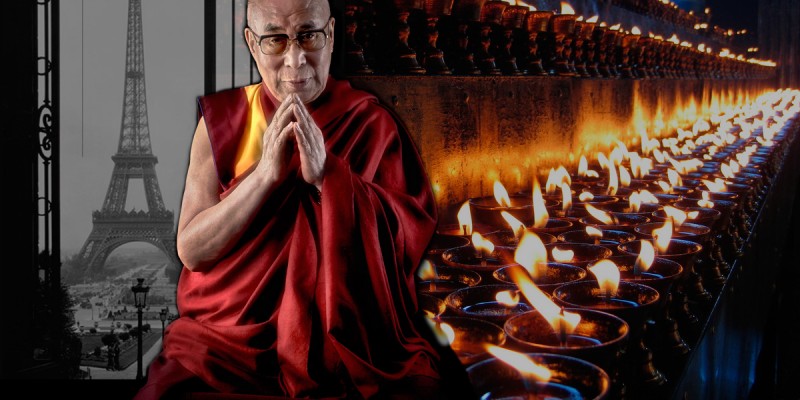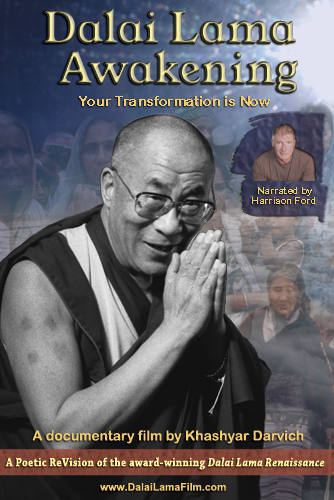
Thus far, His Holiness the Dalai Lama has spoken twice about the November 13, 2015 terror attacks in Paris, which have killed at least 129 people.
On Saturday, November 14, in the Indian city of Jalandhar, the Dalai Lama told reporters:
Violence is a reaction by short-sighted, out-of-control people. At 81, I believe it cannot be resolved through prayers or government help. We have to begin the change at individual level and then move on to neighbourhood and society.
And in an Interview with Deutsche Welle (DW) (Germany’s international broadcaster), the Dalai Lama stated:
The twentieth century was a violent one, and more than 200 million people died due to wars and other conflicts. We now see a spillover of the previous century’s bloodshed in this century. If we emphasize more on non-violence and harmony, we can herald a new beginning. Unless we make serious attempts to achieve peace, we will continue to see a replay of the mayhem humanity experienced in the 20th century.
People want to lead a peaceful lives. The terrorists are short-sighted, and this is one of the causes of rampant suicide bombings. We cannot solve this problem only through prayers. I am a Buddhist and I believe in praying. But humans have created this problem, and now we are asking God to solve it. It is illogical. God would say, solve it yourself because you created it in the first place.
We need a systematic approach to foster humanistic values, of oneness and harmony. If we start doing it now, there is hope that this century will be different from the previous one. It is in everybody’s interest. So let us work for peace within our families and society, and not expect help from God, Buddha or the governments.
And to the question “Your main message has always been of peace, compassion and religious tolerance, yet the world seems to be going in an opposite direction. Has your message not resonated with the people?,” the Dalai Lama responded:
I disagree. I think that only a small percentage of people subscribe to the violent discourse. We are human beings, and there is no basis or justification for killing others. If you consider others as brothers and sisters and respect their rights, then there is no room for violence.
Furthermore, the problems that we are facing today are the result of superficial differences over religious faiths and nationalities. We are one people.
We see world leaders obsessed with economic growth and not concerned about morality. Are you worried about this trend?
Our troubles will increase if we don’t put moral principles over money. Morality is important for everyone, including religious people and politicians.
The Dalai Lama has commented on terror before, as he did about the September 11, 2001 terror attacks on New York City:
Non-Violence, the Appropriate and Effective Response to Human Conflicts
The 11th September attack on the World Trade Centre and the Pentagon were deeply shocking and very sad. I regard such terrible destructive actions as acts of hatred, for violence is the result of destructive emotions. Events of this kind make clear that if we allow our human intelligence to be guided and controlled by negative emotions like hatred, the consequences are disastrous.Taking Action
How to respond to such an attack is a very difficult question. Of course, those who are dealing with the problem may know better, but I feel that careful consideration is necessary and that it is appropriate to respond to an act of violence by employing the principles of nonviolence. This is of great importance. The attacks on USA were shocking, but retaliation by going to war may not be the best solution in the long run. Ultimately only nonviolence can contain terrorism. Problems within human society should be solved in a humanitarian way, for which nonviolence provides the proper approach.I am not an expert in these affairs, but I am quite sure that if problems can be discussed with a calm mind, applying nonviolent principles and keeping in view the long-term safety of the world, then a number of different solutions may be found. Of course, in particular instances a more aggressive approach may also be necessary.
Terrorism cannot be overcome by the use of force because it does not address the complex underlying problems. In fact the use of force may not only fail to solve the problems, it may exacerbate them and frequently leaves destruction and suffering in its wake. Human conflicts should be resolved with compassion. The key is non-violence.
Retaliatory military action by the United States may bring some satisfaction and short-term results but it will not root out the problem of terrorism. Long-term measures need to be taken. The US must examine the factors that breed and give rise to terrorism. I have written to President Bush urging him to exercise restraint and not to seek a brutal revenge for the 11th September attacks. I expressed my sympathy but I suggested that responding to violence with more violence might not be the answer. I would also like to point out that to talk of nonviolence when things are going smoothly is not of much relevance. It is precisely when things become really difficult, urgent and critical that we should think and act nonviolently.
At times the intervention of private individuals or non-governmental organizations can prove very effective in resolving certain kinds of conflicts in the world. Therefore one of the things I suggested to several members of the European Parliament during my recent visit was that, perhaps under the auspices of the European Parliament, a meeting could be arranged of private individuals, people who are concerned about peace in the world, and related non-governmental organisations to discuss how the problem of terrorism can be dealt with and overcome. It would be useful to include people who are considered terrorists or who are seen as supporting terrorism, so that we can learn why they are resorting to or encouraging terrorism. It is possible that some of their grievances are valid. In such cases we need to address them. But where they have no valid grievances or reasons, the true situation should be clarified in order to remove misunderstanding and baseless suspicion.
Human conflicts do not arise out of the blue. They occur as a result of causes and conditions, many of which are within the protagonists’ control. This is where leadership is important. It is our leaders’ responsibility to decide when to act and when to practise restraint. In the case of conflict it is important to exercise restraint before the situation gets out of hand. Once the causes and conditions which lead to violent clashes have ripened, it is very difficult to restore peace. Violence undoubtedly breeds more violence. If we instinctively retaliate when violence is done to us, what can we expect other than that our opponent will also feel justified to retaliate in turn? This is how violence escalates. Preventive measures and restraint must be observed at an earlier stage. Clearly leaders need to be alert, far-sighted and decisive.
Everyone wishes to live in peace, but we are often confused about how that can be achieved. Mahatma Gandhi pointed out that because violence inevitably leads to more violence, if we are seriously interested in peace, we must seek to achieve it through peaceful and non-violent means. We may be tempted to use force because it will be seen as a decisive response, but it is really only a last resort. For one thing, violence is unpredictable. The initial intention may be to use limited force, but violence gives rise to unforeseen consequences. Generally speaking, violence is the wrong method in this modern era. If, on the other hand, humanity were to use more farsighted and more comprehensive methods, then I think many of the problems we face could be resolved quite quickly.
We must continue to develop a wider perspective, to think rationally and work to avert future disasters in a nonviolent way. These issues concern the whole of humanity, not just one country. We should explore the use of nonviolence as a long-term measure to control terrorism of every kind. But we need a well-thought-out, coordinated long-term strategy. The proper way of resolving differences is through dialogue, compromise and negotiations, through human understanding and humility. We need to appreciate that genuine peace comes about through mutual understanding, respect and trust. As I have already said, human problems should be solved in a humanitarian way, and nonviolence is the humane approach.
In this context, to punish an entire country for the misdeeds of an enemy who cannot be found may prove to be futile. Dealing with such situations as we face now requires a broader perspective. On the one hand we cannot simply identify a few individuals and put the entire blame on them, but neither can we target an entire country, for inevitably the innocent will suffer just as they did in the USA on 11th September.
Regarding those who carried the attack
Those who carried out the violent acts of 11th September were also human beings. If something similar had happened to their family and friends, presumably they, too, would have experienced pain and suffering. And as human beings they would naturally have had a desire to avoid that suffering. Therefore, we need to try to understand what motivated them to behave the way they did, if we are to avoid some future repetition of these awful events. I feel that the hatred and destructive emotions underlying the attacks of 11th September have been completely counterproductive for the cause, whatever it might be, espoused by the attackers.The world in which we live today is no longer as simple as it once was. It is complex and all its constituent parts are interrelated. We must recognize this and understand that in order to solve a problem completely we must act in accordance with reality. For example, as the global economy evolves, every nation becomes to a greater or lesser extent dependent on every other nation. The modern economy, like the environment, knows no boundaries. Even those countries openly hostile to one another must cooperate in their use of the world’s resources. Often, for example, they will be dependent on the same rivers. And the more interdependent our economic relationships, the more interdependent must our political relationships become.
When we neglect whole sections of humanity, we ignore not only the interdependent nature of reality but also the reality of our situation. In the modern world the interests of any particular community can no longer be considered only within the confines of its own boundaries. This is something I try to share with other people wherever I go. The dreadful events of 11th September have filled people throughout the world with a revulsion for terrorism, whatever its aims. Therefore, what happened has actually undermined what the terrorists hoped to achieve.
What can we learn from this tragic event?
This tragic occurrence provides us with a very good opportunity. There is a worldwide will to oppose terrorism. We can use this consensus to implement long-term preventive measures. This will ultimately be much more effective than taking dramatic and violent steps based on anger and other destructive emotions. The temptation to respond with violence is understandable but a more cautious approach will be more fruitful.The source of such violence
Generations of suffering and grievances have provoked this violence. As a Buddhist I believe that there are causes and conditions behind every event. Some of these causes may be of recent origin but others are decades or centuries old. These include colonialism, exploitation of natural resources by developed countries, discrimination, suspicion and the widening gap between the rich and the poor. Years of negligence and indifference to poverty and oppression may be among the causes for this upsurge in terrorism. What is clear is that the shocking, sad and horrific terrorist attacks in the USA were the culmination of many factors.Who are these terrorists?
It is a mistake to refer to Muslim terrorists. I believe no religion endorses terrorism. The essence of all major religions is compassion, forgiveness, self-discipline, brotherhood and charity. All religions have the potential to strengthen human values and to develop general harmony. But individuals twist religious beliefs for their own ends. There are people who use religion as a cover to achieve their vested interests, so it would be wrong to blame their particular religion. Religious divisions have lately become dangerous once more, and yet pluralism, under which everybody is free to practise his or her own faith, is part of the fabric of contemporary society. Buddhism may be good for me, but I cannot insist that it will also be good for you or anybody else.To the American people
America is a democratic country. It really is a peaceful and open society, in which individuals have the maximum opportunity to develop their human creativity and potential. After these dreadful incidents we saw the willingness with which Americans, especially New Yorkers, worked to help each other. It is vital to maintain this high morale – this American spirit. I hope that people will keep their spirits up and, taking a broader perspective, calmly judge how best to act.My own wish and prayer is for everyone to remain calm. These negative events are the result of hatred, short-sightedness, jealousy and, in some cases, years of brainwashing. I personally cannot understand people who hijack an entire plane with its passengers to carry out such destruction. It is quite unthinkable. But these were not acts of spontaneous negative emotion. They were the result of careful planning, which only makes them more terrible. This is another example of how our sophisticated human intelligence and the sophisticated technology we have produced can lead to disastrous results. My fundamental belief is that unhappy events are brought about by negative emotions. Ultimately the answer to whether we can create a more peaceful world lies in our motivation and in the kind of emotions and attitudes we foster in ourselves.
I am sure everybody agrees that we need to overcome violence, but if we are to eliminate it completely, we must first analyse whether or not it has any value. From a strictly practical perspective, we find that on occasions violence indeed appears useful. We can solve a problem quickly with force. However, such success is often at the expense of the rights and welfare of others. As a result, even though one problem has been solved, the seed of another has been sown.
On the other hand, if your cause is supported by sound reasoning, there is no point in using violence. It is those who have no motive other than selfish desire and who cannot achieve their goal through logical reasoning who rely on force. Even when family and friends disagree, those with valid reasons can state them one after another and argue their case point by point, whereas those with little rational support soon fall prey to anger. Thus anger is not a sign of strength but of weakness.
Ultimately, it is important to examine our own motivation and that of our opponent. There are many kinds of violence and nonviolence, but we cannot distinguish them through external factors alone. If our motivation is negative, the action it produces is, in the deepest sense, violent, even though it may appear to be deceptively gentle. Conversely, if our motivation is sincere and positive but the circumstances require harsh behaviour, essentially we are practising nonviolence. No matter what the case may be, I feel that a compassionate concern for the well-being of others – not simply for oneself – is the sole justification for the use of force.

Sign up for our Wakan Films email newsletter and receive the very first and latest news from Director Khashyar Darvich and Wakan Films about the release of our new inspiring films, and where they are screening near you.

Sign up for our Wakan Films email newsletter and receive the latest news from Director Khashyar Darvich and Wakan Films about the release of our new inspiring films, and where they are screening near you.